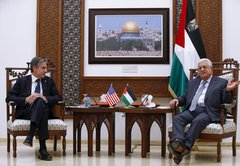Resume ties with the Palestinian Authority
Joe Biden
"Reverse the Trump Administration’s destructive cutoff of diplomatic ties with the Palestinian Authority and cancellation of assistance programs that support Israeli-Palestinian security cooperation, economic development, and humanitarian aid for the Palestinian people in the West Bank and Gaza, consistent with the requirements of the Taylor Force Act, including that the Palestinian Authority end its system of compensation for individuals imprisoned for acts of terrorism."
Biden Promise Tracker

Promise Kept

